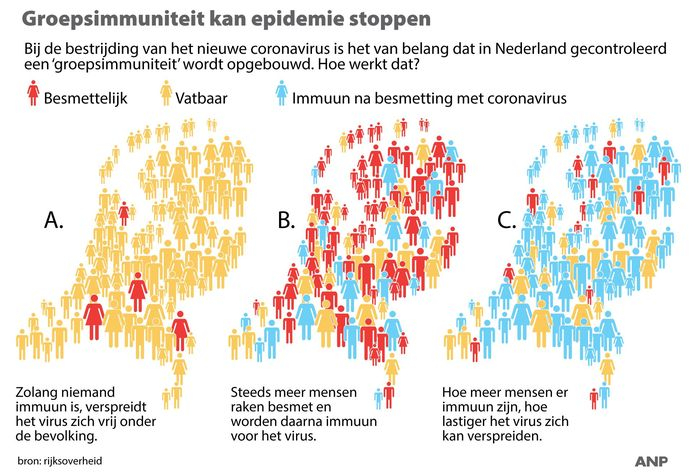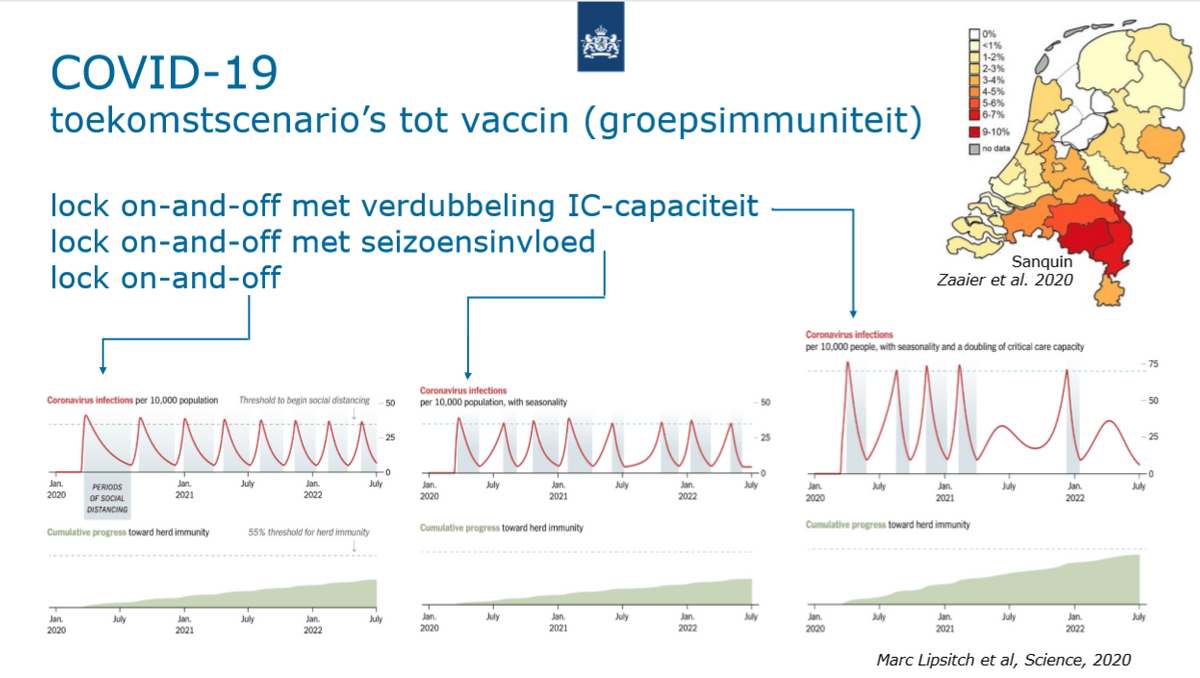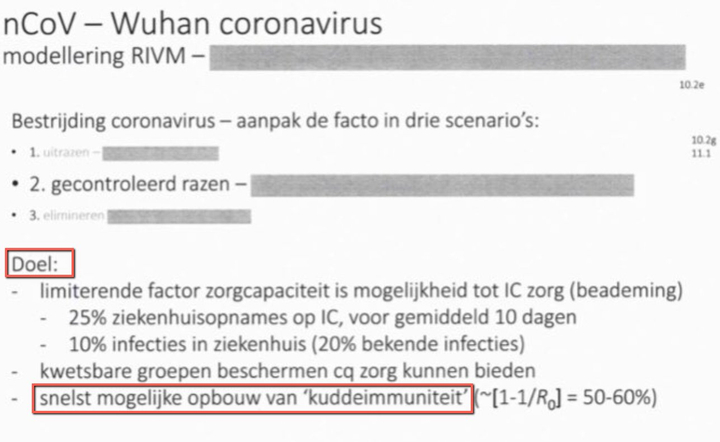Since March 16th of 2020, the Netherlands has pursued a mitigation strategy that allows the virus to spread in a controlled fashion. Gradually obtaining 'herd immunity' has been a central part of the strategy, officially since the middle of March 2020.
Even though herd immunity as a concept has subsequently been de-emphasized (but later admitted), it continues to be an important consideration for the Dutch government and its scientific advisors, as evidenced below. Therefore, this article aims to give an exhaustive overview of the role the concept of 'herd immunity' has played and continues to play in the Dutch coronavirus strategy. We will start with an explainer on what herd immunity means and then go through a chronological timeline which focuses solely on herd immunity related event in The Netherlands.
Herd immunity is usually achieved by vaccination programs, when a large enough percentage of a population has become immune due to vaccines being administered, to the extent that a virus is unable to reproduce. It can conceivably be achieved organically through infections, but this not a known practice – and therefore a highly controversial idea – for human populations, as it will only protect the minority of people that will not at some point in time get infected. The concept of 'overshoot' makes this 'protected' part minuscule. And It's impossible to 'shield' the vulnerable in this process, because there are too many people that would count as vulnerable and it's impossible to rule out risks – especially the risks from human closeness – since many vulnerable people need hands on care. For coronaviruses including COVID-19, the concept of herd immunity is especially controversial, because there is no conclusive evidence on the extent of immunity gained and the duration the supposed immunity will last. Coronaviruses are known to not give lasting immunity and even the RIVM says that it's suspected that severe infections offer the best immunity afterwards. At that point the damage is already done of course, as those people are the ones that often have longterm health damage.
- •March 1st: OMT member and doctor-microbiologist Marc Bonten says on TV that spread will only stop when infected people no longer have contact with others, when a large part (50%) of the population has been infected and is immune, or when there is a vaccine. In the same interview he says he thinks we will need to switch from containment to mitigation and that coronavirus is mild like the flu.
- •March 12th: Officially, The Netherlands pursued a 'containment' approach prior to March 12th, as is detailed in our exhaustive Timeline article. On this day for the province of North Brabant the switch to mitigation is made.
- •March 13th: Jaap van Dissel says '50% of the people in the Netherlands may become infected' and: 'The virus will stay with us, we will have to go through this as a society'.
- •March 15th: OMT member Marc Bonten says on TV: 'Stopping it is impossible. So we have to let it come over us evenly. We also need that, because it will only stop when a large part of the population can't get the virus anymore, because it has build immunity by infection or by vaccination. A vaccine surely will not be there this year.'
- •March 16th: Television address by PM Mark Rutte, explaining the mitigation strategy (named ‘maximum control’) focused on the controlled buildup of herd immunity. Excerpt below.
- March 16th; After Rutte's speech, Van Dissel appears in a TV show to answer questions. He lays bare some of the reasonings behind the strategy, including the herd immunity component. It is expected that the disease is mild enough to let it run through the population and that countries such as China will get major resurgences when they lift their lockdown. He confirms that we want to get more people infected, as long as those people don't belong to a high risk group.
- March 17th: Marion Koopmans, OMT member and virology professor, says on TV that, considering 50% would need to get infected for herd immunity and that the expected death rate is 1-2%, this would mean 40.000-80.000 deaths (correct= 86.000-172.000 deaths).
- In the same show, the TV presenter shows a clip from an interview with international expert Carl Bergstrom. Bergstrom explains why he worries about the Dutch approach, especially the herd immunity component. He also describes a containment strategy as preferred above the Dutch mitigation approach. Koopmans replies that we are doing almost the same as the strategy that Bergstrom proposes, because we are also slowing spread.
- March 18th: Mark Rutte clarifies 'herd immunity is not the goal, but an effect' - although it is unclear what the difference really is. Jaap van Dissel, the head of the Outbreak Management Team said the same that day. See below.
- March 18th: OMT member Aura Timen says about herd immunity:'That's the best protection if you don't have a vaccine yet. But we also fight the virus, we even go further than other countries.'

- April 16th: Only 3% of the Dutch have coronavirus antibodies, as evidenced by a Sanquin study, which is considered to be a major blow to any aspirations RIVM and the government my have regarding the controlled buildup of herd immunity.
- April 19th: in an interview with Dutch broadcaster NOS, Jaap van Dissel and Jacob Wallinga defend the strategy of building herd immunity. Van Dissel says any percentage of people being immune will be 'an invisible wall the virus will bounce off of'. Wallinga adds: "Every immune person counts. But before it is really useful it, it has to rise to 60 percent. I imagine we are hoping for a vaccine or a therapy. But if that doesn't work, by then we'll be well on our way to that 60 percent."
- April 21th: Dutch OMT member Ann Vossen appears on Dutch tv show Jinek and explains that the strategy is to allow the virus to spread slowly, including on children day care centres and primary schools. See video below, from 00:57
•April 24th: The NVIC (national association for intensive care) publishes a report with calculations of the needed ICU beds and time to reach herd immunity levels (50-70% infected).
•May 4th: Is our 'intelligent lockdown' really that intelligent? Nieuwsuur reports on our strategy, including the 'herd immunity' concept that keeps surfacing.
•May 6th: Rutte states in the press conference that herd immunity 'has not been a strategy' and that is not a goal but a side-effect and that this is the strategy 'everywhere', naming some examples: France, Germany, Denmark, Belgium, Spain, Italy. This is not true.
•May 7th: The concept of 'herd immunity' has really disappeared from the OMT talks due to disappointing antibody study results, says OMT member Marc Bonten.
•May 18th: GGD director Sjaak de Gouw says that trying to build herd immunity is the only option that you can do and portrays containment as a strategy that would cause travel restrictions for Dutch people that want to go abroad. Original video. Tweet with subtitled video.
•May 20th: In the technical briefing to parliament members, Van Dissel shows a graph portraying the buildup of herd immunity by infection. He also shows a map with the % of blood donors that have antibodies (3% on average, April 16th), that supposedly indicates immunity. (Tweet) He does say that he doesn't expect The Netherlands to reach full herd immunity by infection, the hope is for a vaccine to complement the natural herd immunity.

- May 25th: Marc Bonten says the acquired herd immunity will likely just be partial, because it takes a lot of time to build it within the limits of ICU capacity and hopefully there will be a vaccine. 'And if not...then it will take a long time before herd immunity will deliver us from the 'new normal''. He also emphasizes that even immunity of for example 20% of the population can allow for more relaxations of measures.
- June 4th: Debate in parliament: prime minister Mark Rutte flat out denies ever having given a speech about herd immunity.
- June 5th: In an interview for newspaper 'Volkskrant', Jaap van Dissel says: 'Because this is a pandemic virus, I think it's an illusion to think that it will disappear. And that means that you have to build immunity. Or the vaccine will be there first.'
- June 19th: According to a reconstruction of events; on the day before the 'herd immunity' speech, the concept was introduced to politicians for the first time. On the day of the speech itself (March 16th) some OMT members supposedly were surprised that herd immunity was part of the strategy. They say they didn't put out a recommendation to strive for herd immunity.
- June 23rd: Van Dissel calls herd immunity a long term prospective, seemingly talking about or at least including herd immunity by infection.
- June 23rd: the new OMT advice states: "The OMT defines 'maximum control' as containing the virus as much as possible in such a way that the number of new infections goes to (almost) zero, so that new outbreaks are prevented or remain manageable". Important: see April 21st, 2021, where it is revealed that the government has always defined 'maximum control' as the build-up of immunity-through infections. As the government bases its strategy on the OMT, it is unclear yet important to know if the OMT advice of June 23rd was an attempt to change course by redefining 'maximum control', or if it had the intent of sowing confusion about the strategy and the various definitions. It did convince many that the build-up of immunity-through-infections was not the goal and/or never had been.
- July 1st: On this day, the official strategy page disappears and redirects to a page about the OMT where a small paragraph about the strategy appears the next day. There are no mentions anymore of herd immunity.
Here, there is a bit of a gap. A summary is: there was a period of confusion about the strategy. Preventive measures were not taken seriously, but there was an official 'road map' presented that was inadequate but at least officially was based on keeping infections-per-day below certain levels. It was never actually used, though Concerns about rising infection levels were dismissed throughout autumn of 2020.
- September 22nd: RIVM's Jaap van Dissel states in an interview: "The Dutch policy accepts a certain measure of virus transmission, as long as vulnerable people and the health care system are not effected. Some measure of immunity provides a certain amount of resilience, is the idea. 'Zero infections is not the goal'". This contradicts earlier policy statements from June of 2020 that said the goal was to bring" infections to (near) zero"
- October 15th: OMT member signs John Snow Memorandum against strategy of immunity through infections, while – contradictorily – reaffirming his earlier stance that suppression efforts have a detrimental effect because it 'reduces naturally acquired herd immunity'. He subsequently gets called out by Deepti Gurdasani, one of the main authors of said memorandum, who calls his stance 'not grounded in science'.
- October 28th: Green Party leader Jesse Klaver states we 'need to live with the virus'
2021: Herd immunity in full view
It was only after the new Parliamentary elections, when ministers admitted that the high number of infections were 'actually beneficial'. Sylvana Simons of BIJ1 was the first MP finally calling out the strategy for what it is: intentionally letting infections soar, with the apparent aim of developing immunity through infections:
And another speech the next week:
- April 21st, released documents, requested by journalists in a so-called WOB procedure (equivalent to Freedom of Information Act), provide further proof that the goal of the Dutch policy was: "the fastest possible build-up of herd immunity", see this Twitter thread by Nieuwsuur investigative journalist Milena Holdert. It also revealed that the Dutch strategy of 'maximum control' is a euphemism for this strategy of a controlled spread with the explicit aim of building immunity-through infections.

- This led to an interesting confrontation, where Sylvana Simons questions why the government considers people who have contracted COVID in the past immune:
A comparison
Just to compare our approach with a different one: